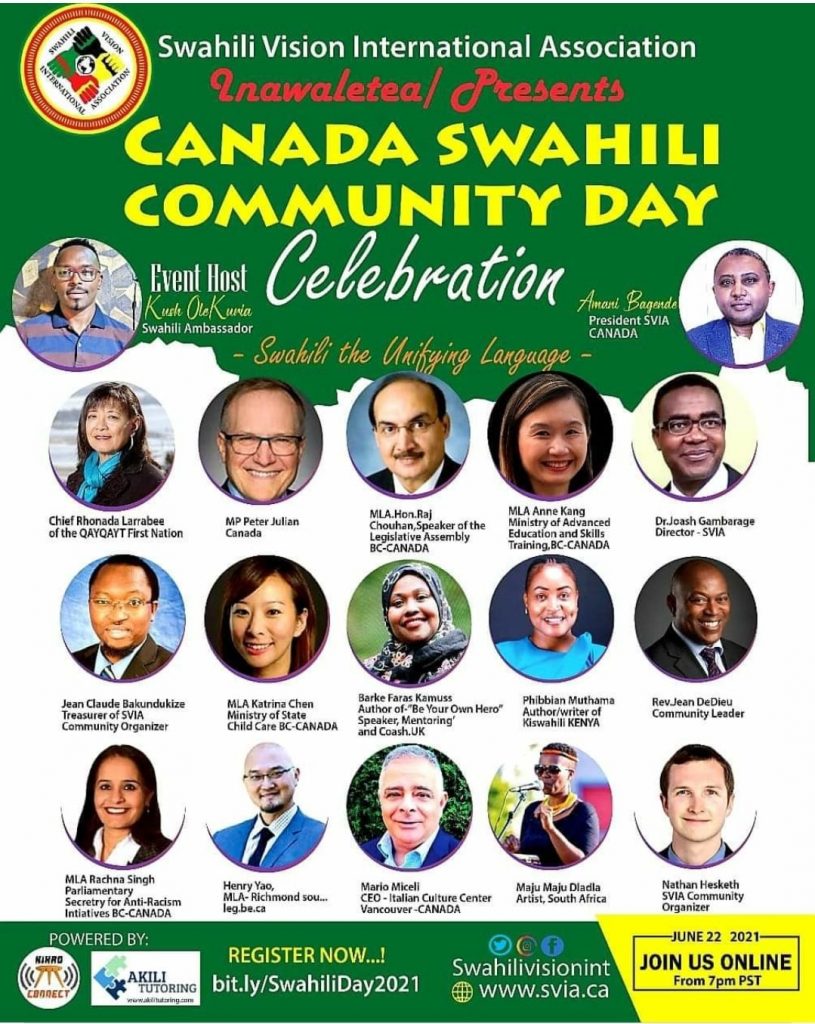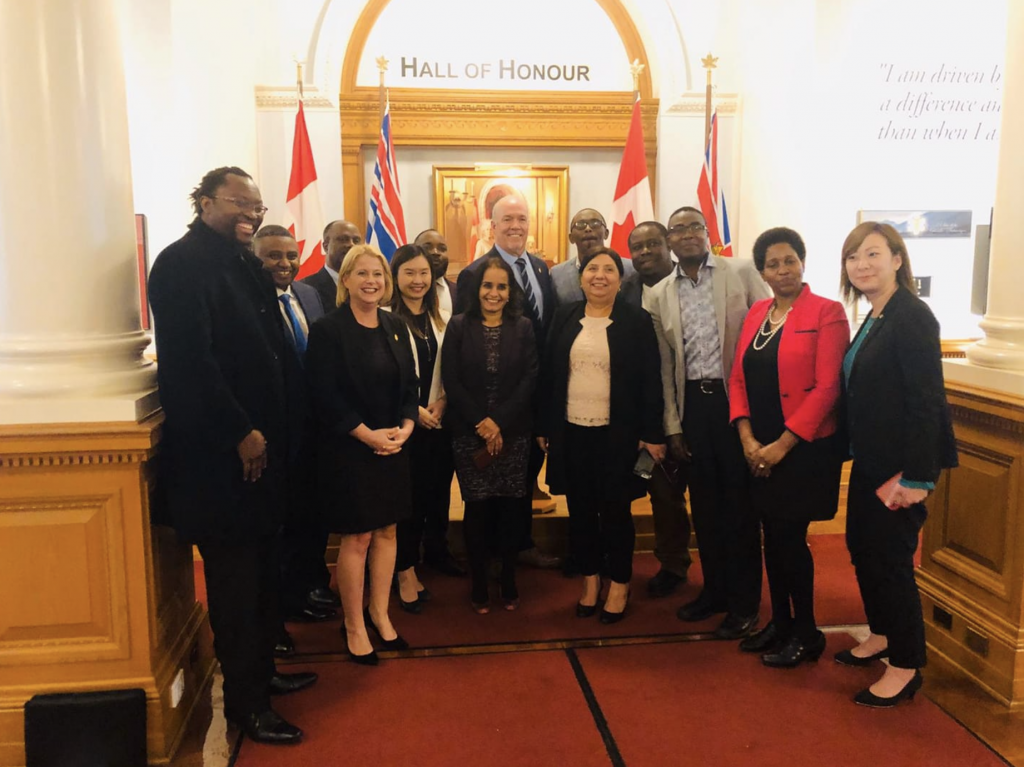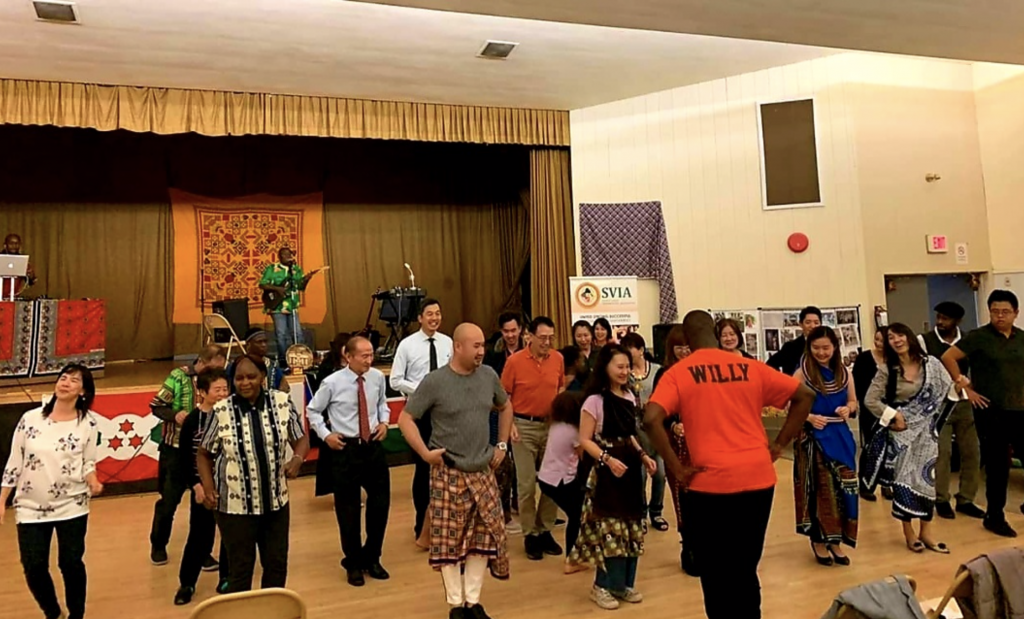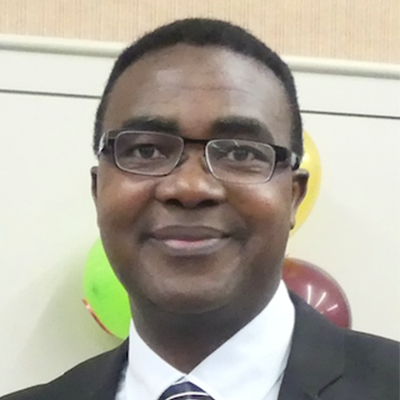July 2, 2021
Written by Heidi Rennert
“Kiswahili kitukuzwe, ndio lugha ya Africa.”
A YouTube video of singer Idd Aziz’s live performance of “Kiswahili” plays on a shared Zoom screen. Heads in the Zoom gallery bob along to the music. The audience’s microphones are muted, but their enjoyment is palpable. After the song ends, Dr. Joash Gambarage (UBC Linguistics) provides a translation.
“Swahili should be praised, it’s the language of Africa.”
So marks the third annual celebration of BC Swahili Community Day, organized by the Swahili Vision International Association (SVIA). The virtual setting of the event, its second since BC’s lockdown in 2020, did not seem to deter the momentum of the new organization. If anything, gathering online reaffirms the SVIA’s broader vision: to unify and uplift Swahiliphone communities across the globe.

The song’s celebration of language is also an appropriate choice for the mission set by Gambarage and his team at SVIA. As a linguist and program director, Gambarage foregrounds language learning in much of SVIA’s community outreach. It’s this recognition of the power of language to create cross-cultural collaboration that defines much of Gambarage’s approach to public scholarship.
In May 2021, Gambarage was awarded the Public Engagement Award by the UBC Public Humanities Hub for his dedication to promoting Swahili language and culture in BC. Having completed a PhD in Linguistics at UBC, he now teaches Swahili and African language courses in the UBC Linguistics department. He also serves as the program director and founding member of SVIA, a non-profit organization registered under the BC Societies Act in 2019. Born and raised in Tanzania, and now living with his family in Canada, Gambarage uses his linguistics training (he is fluent in Swahili, Nata, and English) to foster opportunities, like BC’s Swahili Community Day, for cross-cultural learning and collaborations.

Dr. Gambarage with other Swahili Community leaders in the Hall of Honour, Victoria BC.
In 2019, SVIA successfully convinced the BC government to establish June 22 as a day of celebration for the Swahili community in BC. The event, which drew over 1000 participants in its previous years, boasts a full program of traditional songs, dances, poetry, speeches, and music. The event’s popularity testifies to the growth of Swahili as one of the fastest growing minority languages in Canada and worldwide.
But, as Gambarage notes, though Swahili Community Day is about celebrating and fostering Swahili communities in BC, the day has a larger scope.
“Our mission is to be a diverse community open to everyone who is interested in learning about the Swahili culture and heritage,” he says, “So, this is not just Swahili speaking people.”
Gambarage and his team at SVIA have stayed true to this commitment. In 2021, SVIA was recognized with a BC Multiculturalism and Anti-Racism Award for its emphasis on diversity and combating racism through celebrating African culture and language learning. Their organization has particularly focused on fostering partnerships between Black and Asian communities in BC to address what Gambarage sees as a longstanding gap. In 2019, they partnered with the Taiwanese and Sri Lankan Association in their programming. Their Swahili Arts Exhibition similarly drew in a diverse gathering, emphasizing once more SVIA’s belief that the celebration Swahili language, arts, and culture can “break down walls of separation.”

Swahili Vision International Association partnering with the members of the Taiwanese Association, 2019.
SVIA is continuing to build cross-cultural alliances in BC communities. At their 2021 celebration, SVIA announced the construction of an affordable housing project in New Westminster in collaboration with the Aboriginal Land Trust, a subsidiary of the Lu’ma Native Housing Society. The Sixth Street Housing Project, which will begin redevelopment at 823-841 Sixth Street, aims to “provide multigenerational and multicultural housing for members of both the Urban Indigenous and Swahili communities.”
Language, Culture, and Community
Gambarage was nominated for the Public Engagement Award for his tireless work in bringing his linguistics training to community activism. His PhD research focused on complex syntax in Nata, one of the native languages of Tanzania. Drawing on this research, Gambarage is now involved in a number of creative projects focused on making Swahili language learning accessible for children and anyone else who is interested. He facilitates summer camps and programming for youth, has recorded educational music resources (to be released soon), and is collaborating with a cartoon network to create an animated series of videos on Swahili language learning. He is also leading the publication of two instructional books on new language teaching and learning approaches.
Gambarage’s department nominated him for his tireless commitment to using his linguistics training to give back to his communities through accessible education, both in his hometown in Mugeta (where he founded Mugeta Children’s School) and in the Swahili community in BC.
“In introductory linguistics courses, we often point out to our students that one concrete way to combat prejudices against unfamiliar cultures, and the lazy assumption that other ethnic or racial groups are less advanced than our own, is to study their languages in depth,” his department writes of Gambarage, “By teaching in ways that bring this complexity to young children of all races, and with a lighthearted touch, Joash is putting this rhetoric into practice!”
For Gambarage, being both a public scholar and linguist means affirming the inseparability between language, culture, and community:
“To me as a linguist it means how I can use language to address certain social problems. Imagine using the Swahili language here in BC to create a platform for cross-cultural understanding. Isn’t that cool? I can therefore define public scholarship as intellectual activities that support public good including fueling debates about language, culture, gender disparity and artistic works. That is what I value and believe to be the true meaning of public scholarship.”
Collaboration also means inviting diverse and active participation in celebrating culture and language. “[My partners and I] co-produce knowledge by creating an engaged citizenry where everyone is welcome to eat our cuisine, put on a costume, dance with us and mingle with the Swahili people to appreciate diversity.”
Future Projects
Gambarage is keen on promoting Swahili to anyone who is interested. SVIA currently hosts 15 free Swahili learning courses at the SVIA Swahili School. Gambarage emphasises that these classes are open to all, regardless of age or language ability. “We encourage especially people who never had any interaction with Black people or people of African descent to use this opportunity to gain cross-cultural understanding.”
Finally, he and his team at SVIA are planning to establish a Canada Institute of Swahili, the first of its kind in North America. “So,” he concludes, “we are dreaming big!”
Visit SVIA to learn more about upcoming events or how to get involved in programming. Stay tuned this Fall for Swahili Exhibition Day, which will feature live performances and work from local Swahili artists and entrepreneurs. You can also sign up for free Swahili language courses at the SVIA Swahili School.
 Dr. Joash J. Gambarage (he/him/his) is a 2021 recipient of the Hub’s Public Engagement Award and a Sessional Lecturer of Linguistics in UBC Language Sciences. View his faculty profile for more information.
Dr. Joash J. Gambarage (he/him/his) is a 2021 recipient of the Hub’s Public Engagement Award and a Sessional Lecturer of Linguistics in UBC Language Sciences. View his faculty profile for more information.